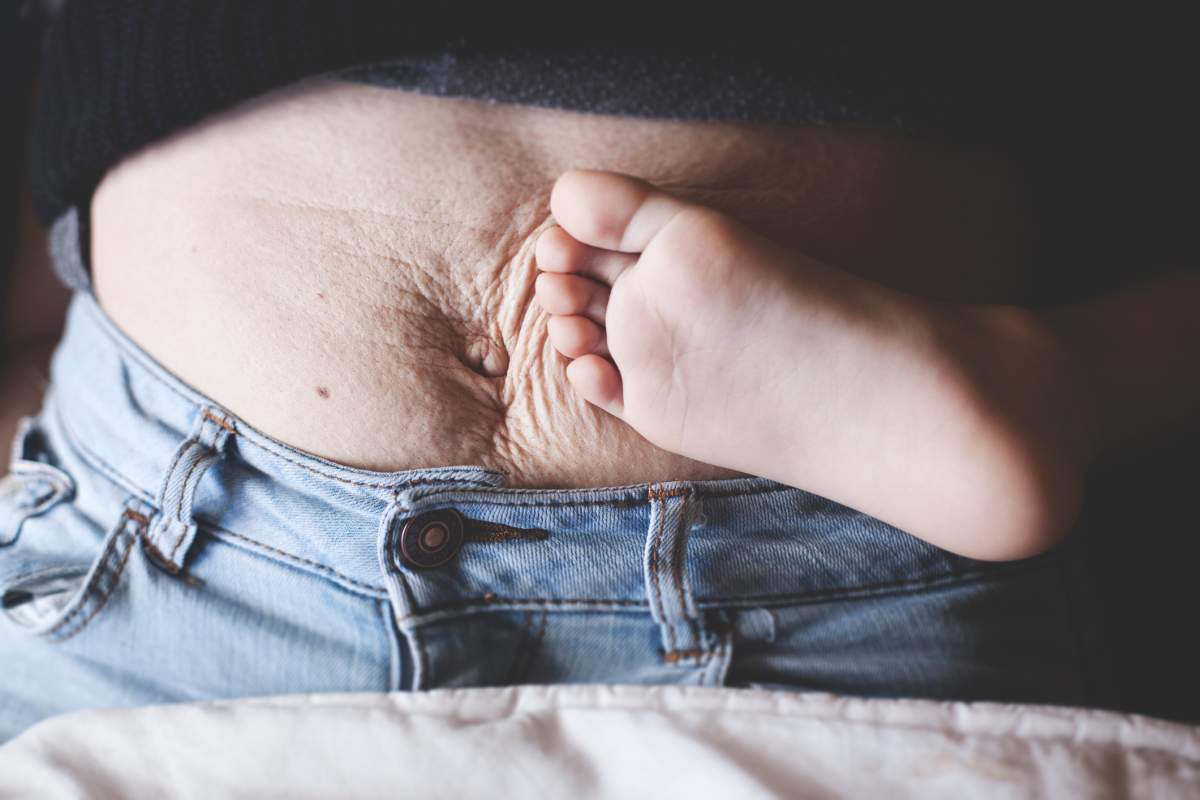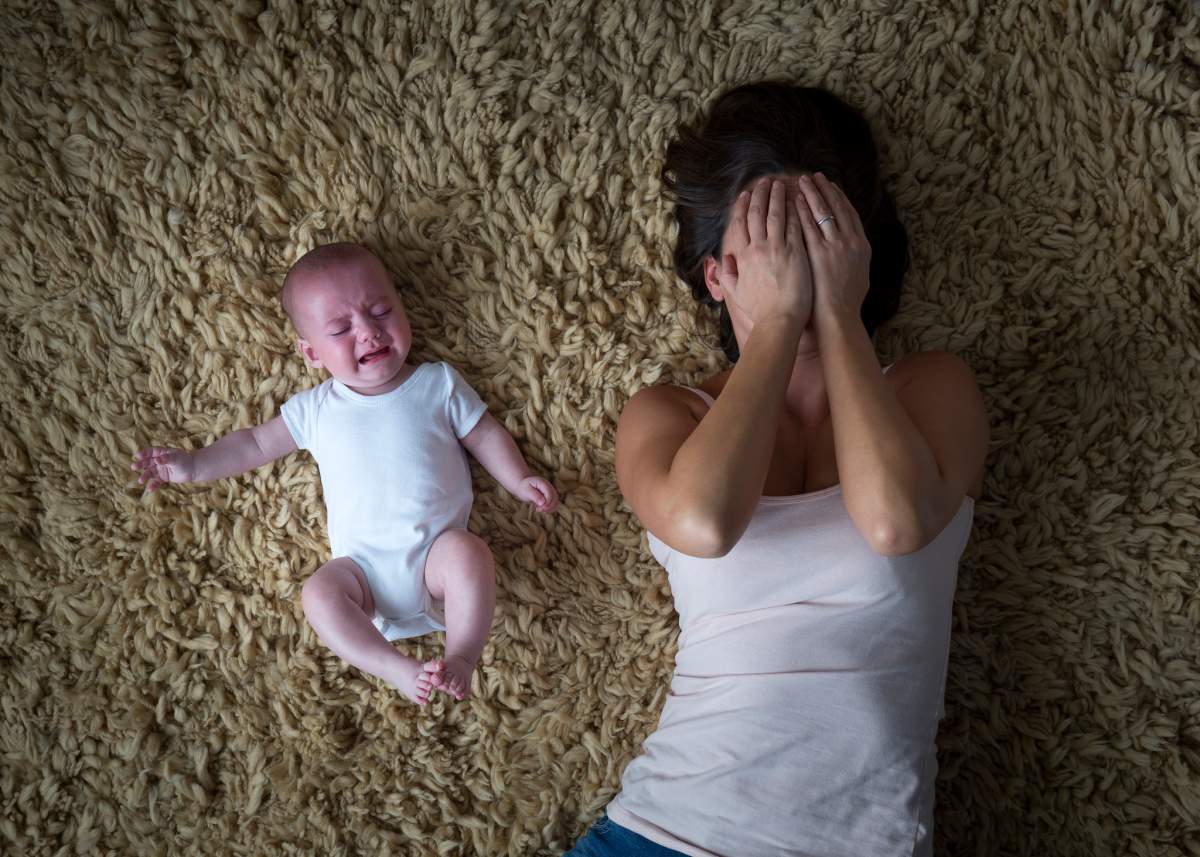
The mom from Toronto’s story isn’t unique. Many women not only feel mentally, emotional and physically different after giving birth, but there are significant changes to their bodies than can be longer-lasting.
READ MORE: Triplet gives birth to her own set of triplets: ‘I have fallen in love’
These can range from smaller (or bigger) breasts to losing hair and, more commonly, bladder issues.
Hunter gave birth to her fifth child, a daughter, in June.
Getting your body back
But the idea you need to get your “body back” is something that comes up often.
“I would tell new moms it takes time to get your body back, but sometimes, even when you get to your pre-pregnancy weight, your body shape changes,” she said. “It’s OK… your body is beautiful no matter what for what it is able to do.”
Credit: Getty Images

Get breaking National news
Denise Chiriboga, founder and creator of Strong Mom, a fitness class targeted at moms, hears this sentiment often.
“Unfortunately we don’t give a large thought to recovery and what post-partum recovery actually looks like, as this is not something most doctors talk about,” she told Global News.
“Recovery isn’t just resting at home and waiting for your six or eight week checkup — it’s learning how to retrain the deep core and pelvic floor muscles to regain their strength and their function.”
READ MORE: Wait, There’s More podcast: Young, pregnant and in crisis
Chiriboga says most people want to feel “normal” again, but often can’t accept their new bodies. They also compare themselves to celebrities or others on social media, she said.
“We always want that, “I never had a baby look” like the celebrities do.”
But she says it goes beyond self-esteem and confidence. New moms need to accept that our bodies took nine months to grow a baby, so it’s going to take time to lose the weight.
“Thankfully, people like Meghan Markle have stepped out and she in her post-baby body has been applauded for taking time and being confident in rocking her post-baby body and taking it slow in her recovery,” she explained.
“The biggest thing we need to do is appreciate ourselves more.”
Women share the biggest changes
But for some women, it’s the learning curve of going into motherhood, not knowing which parts of your body will change.
For Jenny Rodrigues, a communications professional in Toronto, it was pain in her hands hands and wrist.
The mom of a 20-month-old says most of it was the result of trying to support her newborn’s wobbly head and neck.
“I was also breastfeeding and the recommendation was to do ‘compressions’ to squeeze out the breast milk faster. That also put such a strain on my hands. I was wearing sports tape around my wrists for a long time.
“I had to do physio and acupuncture on my hands to get better.”
For Vanessa Perkins of Brampton, Ont., it was her pelvic floor that was the biggest change post-birth. Sitting was uncomfortable and when her period came back, it was hard to use tampons again.
She also had heavy, saggy breasts and had loose skin around her stomach.
READ MORE: Baby bumps aren’t the same size — here’s why
Perkins knew her mental health was suffering.
“With my first son I lost myself,” she continued.
“I was no longer Vanessa, I was only Jeremy’s mom.”
Gina Létourneau, of Toronto, said each pregnancy can feel different — she had more difficulty breathing with her second child than the first.
She also dealt with heartburn, a heavier period and pelvic floor issues. But when it comes to losing baby weight, she urges new moms not to feel bad about it.
“I am so much more than my appearance now — I am responsible for two beautiful boys and it keeps me busy and happy enough,” she told Global News.
“Don’t let anyone reduce you to how you look… you are fine, you are loved, you are important to this little being who needs you and loves you unconditionally.”
Jennifer Francis-Smikle, a mom in Markham, Ont., adds one of the biggest things new moms (or any mom) who still feels unsure about their bodies can do is avoid social media.
“‘Snapback’ culture is basically the celebrities or Instagram influencers coming on social media showing their body right after having a baby,” she said.
“Most times it looks like they didn’t have a baby or better than they did pre-baby. It can be disheartening to see especially if you’re not comfortable in your own skin.
Not feeling like yourself
Chiriboga says while it may be hard to grasp, it’s important to remember to honour and respect the body post-birth.
“For moms not feeling like themselves, is it a physical or emotional thing?” she asked. “It all affects a mom emotionally and physically and these are the hard things to control.”
And most importantly, take time.
“Don’t be so quick to go back to the gym and do the exact same exercise you did before you had your baby or before you got pregnant,” she said.
“Avoid the ‘harder, faster, stronger, no pain no gain’ mentality or classes promoting this type of exercise for now. You are not ready for this yet.”










Comments